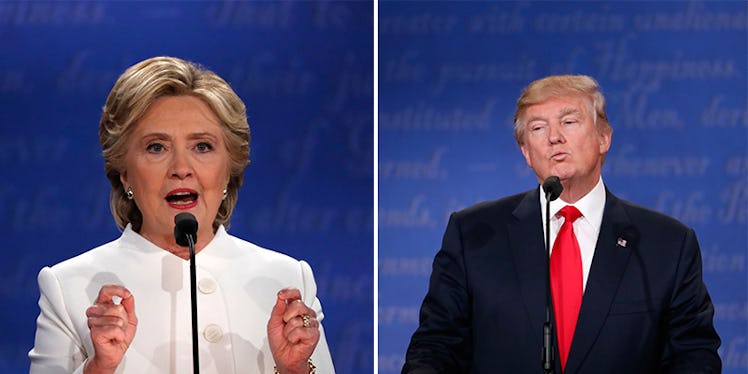
Trump's 'Nasty Woman' Comment Is What Silences All Women On A Daily Basis
Last night's debate was a truly shocking portrayal of what women go through whenever they're in the presence of a group of men.
The constant interruptions, fueled by the condescending tone of someone who thinks he knows so much better, gave me flashbacks to work meetings, discussions in college lecture halls and conversations with groups of friends at bars.
Donald Trump calling Hillary Clinton a "nasty woman" while she was discussing her plans for social security particularly resonated with me.
Twitter turned the phrase into a kind of girl power mantra last night, which I'm totally all for. But it's hard to ignore the implications of what "nasty woman" really means: a powerful woman who's assertive and strong in her convictions.
Essentially, "nasty woman" has become the new "bitch."
'Nasty woman' has become the new 'bitch.'
It's even harder to ignore the fact that Trump has spent this entire campaign acting not only powerful, assertive and strong in his convictions, but volatile, aggressive, fear-mongering and, frankly, terrifying.
And not once did Clinton ever call him any names on the national stage, even when she probably had every right to. (Serious kudos to her for keeping her cool.)
It's a tale all confident, assertive women know too well: Men get a free pass to throw their opinions and attitudes around like everyone should be honored to listen to them, yet the second we do the same, even if to a LESSER DEGREE than men, we're dismissed and ignored.
We're regarded as the bitches, the cunts — the "nasty women" — when we behave in a similar way that men do.
We're regarded as the bitches, the cunts — the nasty women — when we behave in a similar way that men do.
The decision to either assert ourselves or face the social consequences of being labeled these terms and garnering these reputations is something women grapple with in nearly every single one of our daily interactions.
Media and advertising campaigns sell this idea of "female empowerment," but the threat of labels scares us into being polite, into silencing ourselves, into not making a scene, even if we're uncomfortable, offended, slighted or hurt.
It's one thing to try to be the strong, powerful woman that our mamas raised us to be, but it's another thing entirely when we confidently offer our opinion in a classroom and get interrupted by a male classmate, or when we suggest a great idea at work only for a male co-worker to repeat it five minutes later and get all the credit for it.
Staying silent when that shit happens gets really, really exhausting.
Our country needs to focus on more than just teaching women to raise hell. We need to teach others to respect our voices and opinions when we do.
Because right now, women experience the ultimate catch-22: We're told to make our voices heard, but we've also been and are continuing to be told to shut up.
We're told to make our voices heard, but we've also been and are continuing to be told to shut up.
And when this dynamic plays out on the national stage, between two of the most powerful people in politics right now, in front of millions of American citizens, it only reinforces the sexist ideology that's so strongly woven into our culture: a woman's voice can never be as loud as a man's, no matter how much she screams.